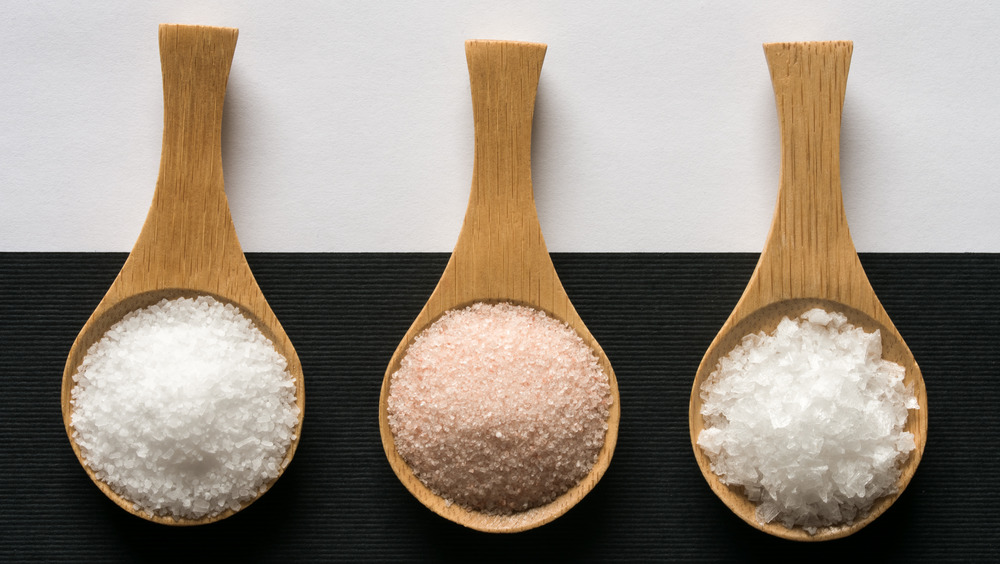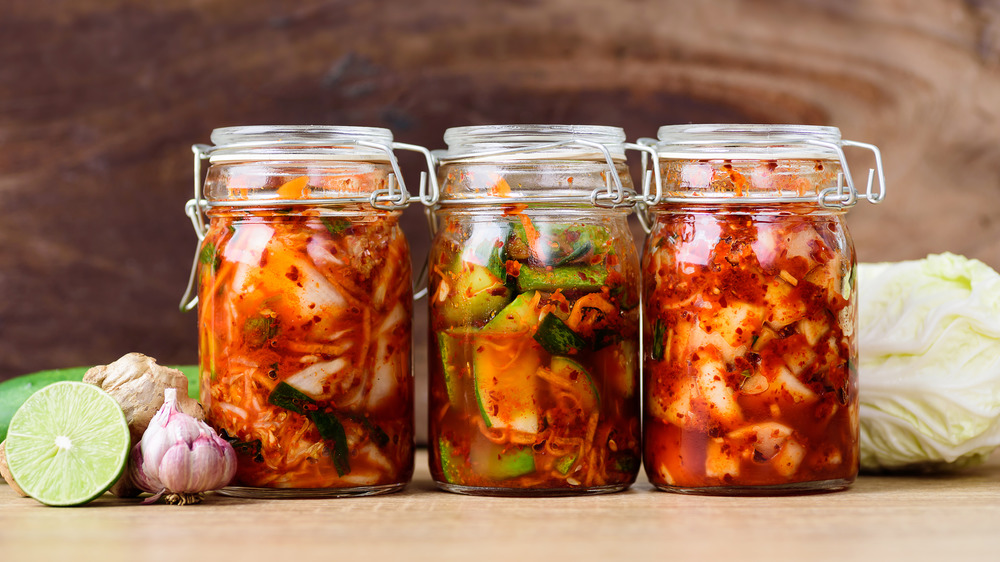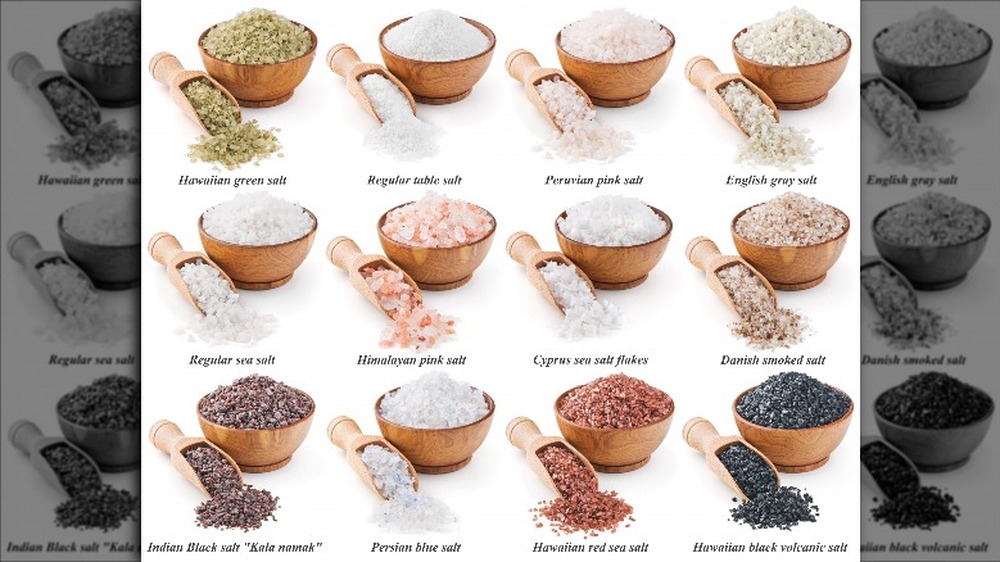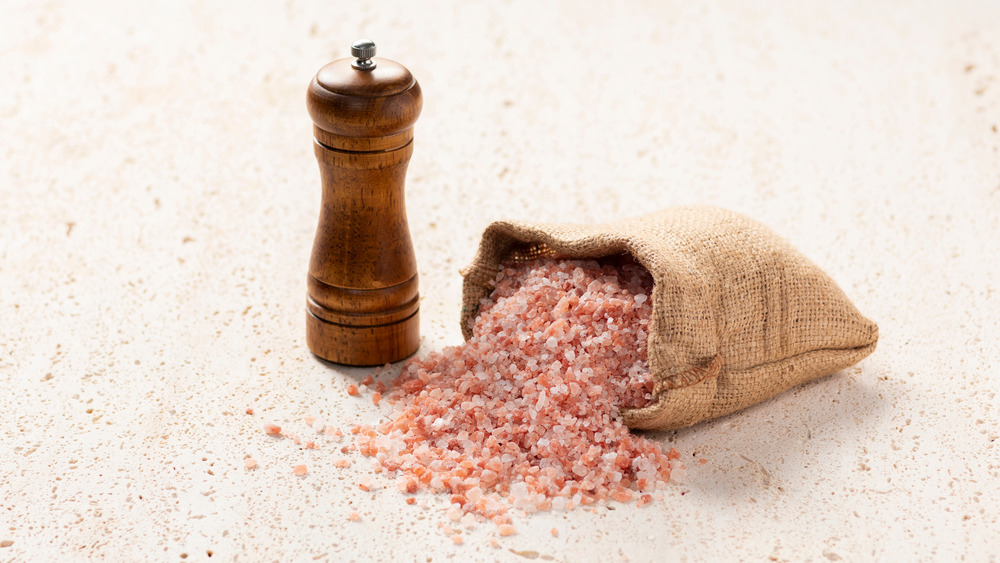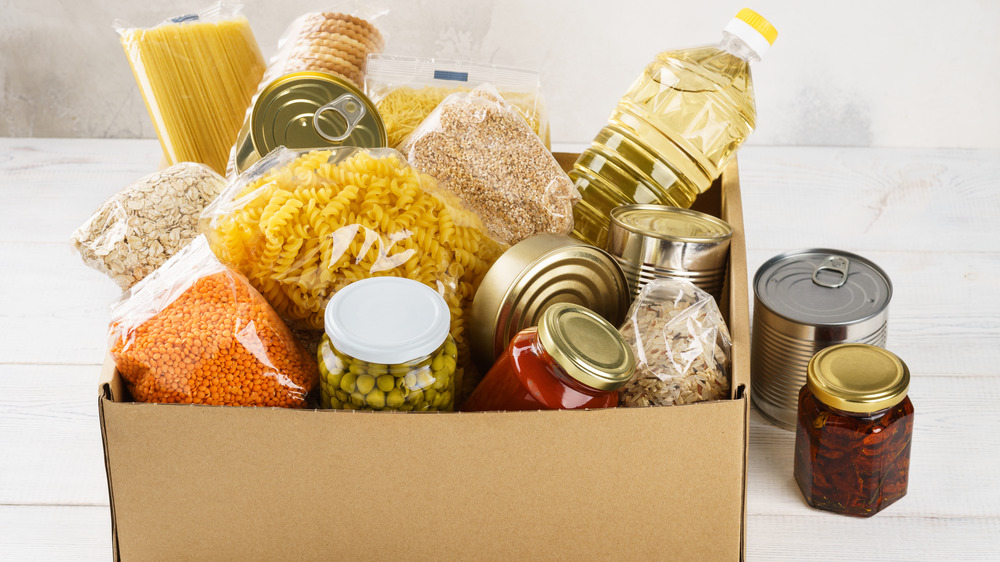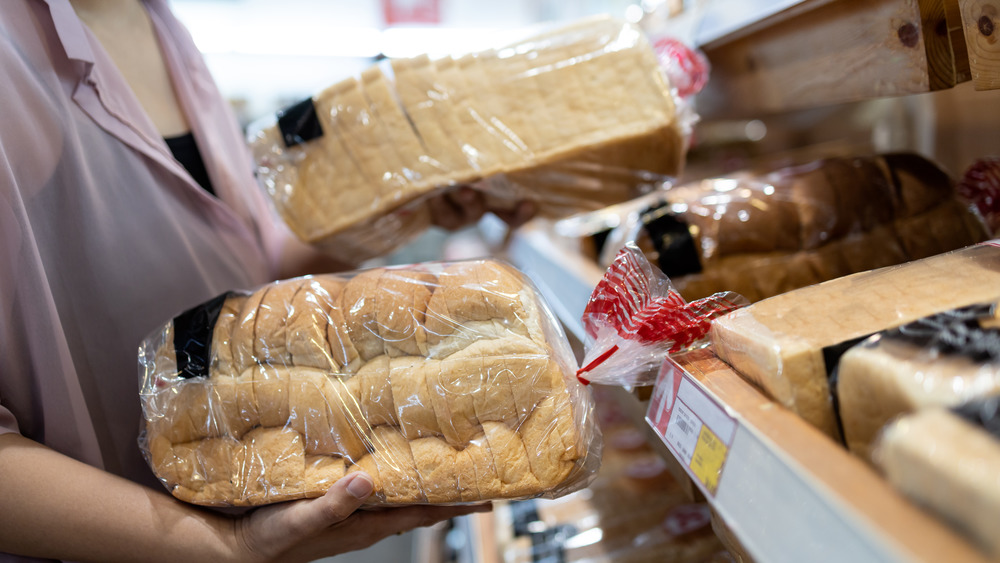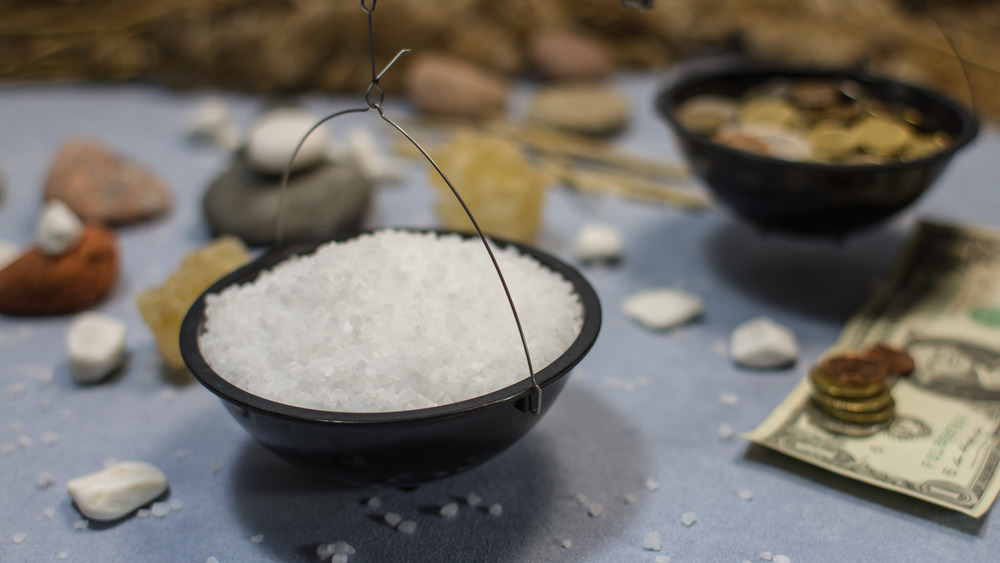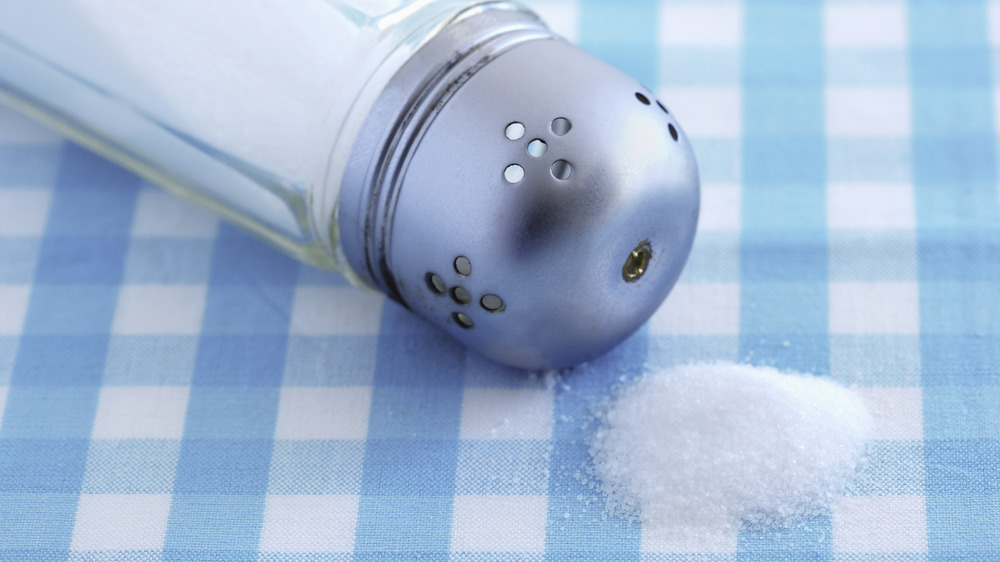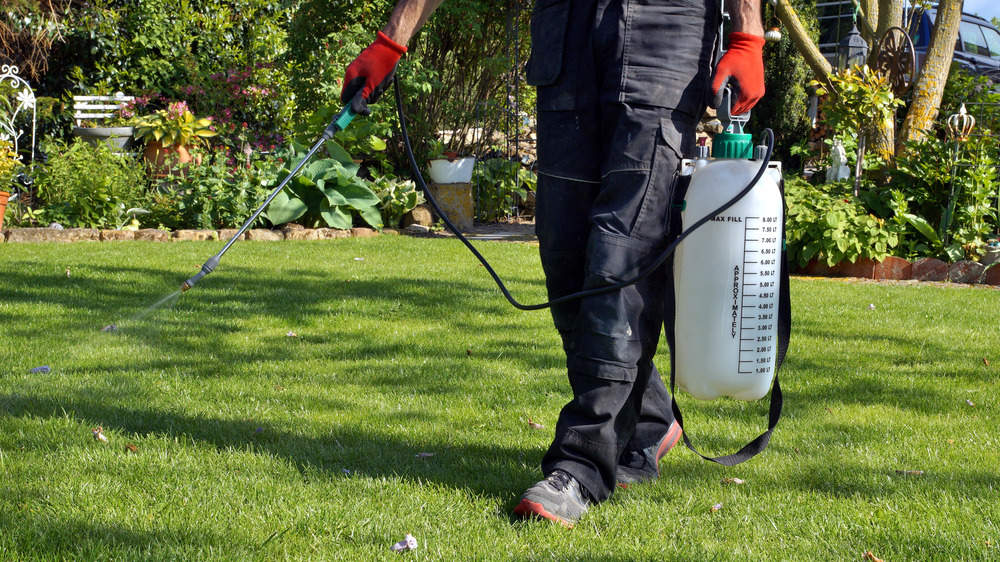Salt: Everything You Didn't Already Know
We may receive a commission on purchases made from links.
A pinch of salt may be one of the first things you add after taking a bite of a bland meal. Salt is a mineral that enhances the flavor of food, and saltiness is one of the basic tastes our tongues are sensitive to (via Science of Cooking). While flavoring is a primary use of the mineral, there's much more to salt than flavor enhancement.
The fact that the word "salt" has made it's way into our language in the form of idioms and metaphorical phrases is telling. Maybe you've commented on someone being salty, or told someone to take something with a grain of salt. Have you ever thought not to rub salt into someone's wound, or been told someone is the salt of the earth? That last one is a biblical reference to salt — and it's not the only one. There's the infamous story of Lot's wife being turned into a pillar of salt. From salt's history to its usage, it's properties to it's health implications, here's some information to grow your knowledge about your favorite seasoning.
Salt was an early food preservative
For early humans, salt was a precious commodity — not just because it enhanced the flavor of the foods they consumed, but because it kept them safe. "Salting food was one of humankind's earliest food preservation technologies," Dr. Bryan Quoc Le, food scientist and author of 150 Food Science Questions Answered, told Health Digest. "Humans relied on salt as a way to ensure food was kept safe from microbial decay."
Before the manufacturing efforts we rely on today — we're talking about a time in history prior to refrigeration, modern-day food storage, and packaging and shipping options — food providers relied on salt to decrease the water activity in a food. Water, unbound to another element, was therefore "available" to bind with something else, a potential chemical reaction leading to microbial growth, according to a report by the Institute of Medicine.
Today, chemical preservation relies largely on other additives that serve as antibacterial agents (via RWJ Barnabas Health). However, some foods still rely on salt as a primary means of preservation (e.g., cured meats, pickled cucumbers, and salted cheeses) and reducing the salt content of them is a challenge for food safety, as the book Reducing Salt in Foods highlighted.
There are a dozen primary types of salt
Salt can be harvested in mines and collected by evaporating sea water (via Harvard's The Nutrition Source). As Country Living highlighted, 12 primary types of salt exist, falling into traditional table salt (or iodized salt), kosher salt, flake salt, smoked salt, pickling salt, and several kinds of sea salt, including the popular pink Himalayan salt.
"Of all the salt that is available on the market, the healthiest is pink Himalayan salt," Trista Best, registered dietitian and consultant with Balance One Supplements, told Health Digest. "This form of salt is the most nutrient-dense salt available and is popular in many kitchens worldwide." Although this type of salt may contain 84 different trace minerals, it should be noted that these various minerals are so limited in quantity (less than 2 percent of the salt), they don't likely offer signifiant health benefits (via Medical News Today). It is, however, harvested by hand and minimally processed, according to Healthline, so it can be a more desirable and purer alternative to traditional table salt.
Otherwise, how might you choose? Some expert chefs can detect flavor differences, while others choose based on texture or color and how well it incorporates into a meal (via The Washington Post). Still others undoubtedly rely on convenience or price.
Salt can't be certified organic
One of the priorities of the U.S. Department of Agriculture (USDA) is food safety. And one facet of that mission is making sure food and beverages are properly labeled, including the proper use of the term "organic" on products. The USDA, not the U.S. Food & Drug Administration (FDA), oversees the National Organic Program, which regulates the use of the term "organic" on food and beverage packaging.
Unless a farm or manufacturer verifies organic compliance, they cannot label, represent, or sell their products as organic, according to the USDA. Although this sounds pretty clear cut, salt complicates matters. "Salt can never be 'certified organic' because a food has to be an 'organic' living compound in order to qualify for that certification. Salt is a mineral and technically [a] nonorganic (aka 'non-living') compound," Meaghan Thomas, co-owner of Pinch Spice Market, told Health Digest.
Nevertheless, salt is allowed in organic foods, according to USDA organic regulations, if it is free from "prohibited additives" (like anti-caking agents). Additionally, you may see a label declaring "organic salt." The USDA explained, "Something could be labeled an organic salt but that would mean that there were other ingredients in the product that were certified organic, but not the salt itself."
Salt is just one source of sodium in our modern food supply
Just as there are recommended daily amounts for vitamins, there are guidelines regarding sodium. In order to properly function, the body needs some sodium — less than 500 milligrams per day, according to the American Heart Association. However, most Americans are far exceeding that minimum level, to the tune of thousands of milligrams daily.
"One teaspoon of salt contains 2,300 milligrams of sodium," Brenda Braslow, registered dietitian nutritionist and certified diabetes care and education specialist, told Health Digest. Braslow continued, saying, "In food processing, many forms of sodium compounds exist." Salt, or sodium chloride, is in the company of sodium citrate, sodium nitrate, sodium chloride, and sodium sulfate — each of which is present in our food supply and medications.
These sodium compounds are in common prepackaged (think: frozen dinners), processed (watch out for that soup), and restaurant foods. In fact, more than 70 percent of the sodium we consume comes in these formats (via American Heart Association). Some top offenders include pizza, sandwiches (especially those with deli meats), and burritos.
Bread is a top source of sodium in our diets
Cereal products, in particular bread, are a major source of salt in out diets. While the grains used in bread are naturally low in sodium, salt is added during processing to add to the flavor and ferment the yeast (that's what makes the dough rise), reported the San Francisco Chronicle. And the result is astonishing. Just two slices of bread can account for a quarter of your daily sodium intake. This might explain why 90 percent of Americans — both children and adults — consume more than the recommended amount of sodium (via the Centers for Disease Control and Prevention).
A 2018 survey undertaken by the World Action on Salt & Health, based in London, showed some breads contain the same amount of salt as seawater. And while a reduction of the salt content in bread might be significant in terms of improving our health, it might detrimentally impact the process of bread production, including "shelf-life, bread volume, and sensory characteristics," a 2012 review in Critical Reviews in Food Science and Nutrition noted.
Reducing salt may reduce your risk of dying from heart disease
Sodium is a mineral we physically need. It helps transmit nerve impulses, ensures proper muscular function (including those of the cardiovascular system), and maintains proper fluid balance in the body, according to Harvard Health Letter. But too much sodium in your system is problematic.
"High salt intake is one of the most important risk factors for hypertension, chronic kidney disease, and heart failure," Dr. Spencer Kroll, internal medicine specialist and cholesterol and lipid disease expert, told Health Digest. "A modest reduction in salt consumption lowers blood pressure, and long term, lowers cardiovascular disease."
When you eat too much salt, your body retains extra water to keep your sodium levels at the correct concentration (via Harvard Health Letter). A reduced salt intake reduces fluid retention, and this leads to a lower blood volume — hence lower blood pressure as well as reduced stress on the heart. "People at risk for [high] blood pressure should avoid table salt entirely and read nutrition labels as well as choose foods lower in sodium," Dr. Kroll advised.
Restricting salt intake too much is actually dangerous
No doubt we can all benefit from a little less salt in our diets. Nevertheless, problems can arise if your sodium intake falls below the minimum your body needs, which is, according to the American Heart Association, 500 milligrams per day.
For one, insulin resistance — which leads to an inability to properly metabolize sugar and a risk for type 2 diabetes — might increase with a low-sodium diet, a 2011 study in Metabolism found. Another study found that a low-sodium diet resulted in higher cholesterol levels, including LDL (or "bad") cholesterol, and an increase in triglycerides (a type of fat in the blood). Additional studies found that for those with heart failure or diabetes, salt restriction might increase the risk of death (via Healthline).
While reducing your sodium intake is likely good for your health, a very low-sodium diet might not be ideal, either. This is especially true if you have an existing condition requiring special dietary considerations.
This word was derived from the Latin word for salt
Thousands of years ago – 6050 BC, to be exact — salt was a form of currency (via SaltWorks). Moorers traded salt for gold, and slabs of rock salt were used as coinage in Abyssinia according to Time. Per SaltWorks, "The expression 'not worth his salt' stems from the practice of trading slaves for salt in ancient Greece." And in central parts of Africa, salt cakes were once a dominant form of currency (via Time).
When Roman soldiers were sent out on missions, they often ended up on what was known as Via Salaria, or the "salt route." Time explained, "Not only did salt serve to flavor and preserve food, it made a good antiseptic, which is why the Roman word for these salubrious crystals (sal) is a first cousin to Salus, the goddess of health."
Salt was highly valued at that time, so the solider's pay was, in part, provided in salt (although some would argue they were paid an allowance towards the purchase of salt). Interestingly, the Latin word for the soldier's income was "solarium argentum." The French took it from there, using the word "salaire." Eventually the word made its way into modern English as "salary" (via NPR).
Salt is often linked to bad luck
Salt had value in many civilizations before the establishment of metalic coinage and formal currency (via SaltWorks). Therefore, spilling salt, and subsequently rendering it useless, was more than an unlucky disappointment, it was costly. So it's no surprise superstitions surrounded the misfortune of a salt spill.
Some believe that these superstitions started after Leonardi de Vinci depicted a salt spill in his masterpiece, The Last Supper, according to SaltWorks. If you look closely at the painting, Judas Iscariot, the Apostle believed to have betrayed Jesus, appears to have knocked over the table salt, an article in Artibus et Historiae revealed.
In some regions, like England, the superstition takes the form of a premonition: The spiller will shed tears in equal amounts to the grains of salt spilled, according to Morton Salt. And in the United States, you might see a superstitious person toss some salt over their shoulder after a salt mishap. Their left shoulder, that is. You know, to hit the Devil in the eye and prevent any further evil (via Morton Salt).
Salt can act as an herbicide and insecticide
Naturalists will tell you, using a homemade weed killer made from salt and water is effective and safe for the environment. But what about a bug killer? Because weeds might be a nuisance, but insects are, well, pesky.
As it turns out, salt was used as a pesticide beginning many centuries ago. In fact, a historical review in Agricultural History attributes author Gervase Markham, who wrote Farewell to Husbandry, as noting "ants never breed in salty ground" back in 1620. Another author cited in that same historical review, Adolphus Speed, advocated for the control of worms with a brine spray.
Salt may also convince leeches to detach from your body, and a salt water mixture can get rid of worms in cabbage plants (via Mother Earth News). In Brazil, salt was shown to significantly increase insect mortality when applied to soybeans, according to the Centre for Agriculture and Bioscience International.
Salt may be making you gain weight
Hypertension has often been associated with high sodium intake. Quite simply, excess water in your bloodstream, caused by a high sodium intake, increases your blood pressure, as the Cleveland Clinic explained. So it's no surprise that salt intake is a risk factor for cardiovascular health problems (via Centers for Disease Control and Prevention). A 2015 study in Hypertension also demonstrated that a high salt intake is a "potential risk factor for obesity."
For one, sodium consumption can make you feel both thirsty and hungry, as a 2017 PLOS One study explained. It's no wonder you want to down an entire bag of potato chips once your tastebuds are introduced to all that salt. And who doesn't like a cold beverage when downing salty fries? It's your body's physiological response to the sodium you are consuming.
And those soft drinks you might consume when indulging in salty foods? That's one of the reasons a high-salt diet is linked to obesity. It turns out that a high-salt diet might be a predictor of greater consumption of sugar-sweetened beverages, and therefore is associated with a higher risk of obesity, a 2012 study in Pediatrics found.
You might sleep better with less salt in your diet
When you finally feel like you're getting a good night's sleep, nothing is worse than waking up with the feeling that you have to pee. Though grateful, of course, that your body woke you up, you head to the bathroom before going back to bed. Sometimes, however, the disruption can make it difficult to fall back to sleep.
Noctoria is the name for the condition that causes you to wake up in the middle of the night due to having to urinate, according to the Cleveland Clinic. The seemingly minor problem can lead to increased stress, irritability and fatigue, and can influence overall quality of life, a 2017 study by the European Association of Urology revealed.
Although the condition can have various causes, it has been linked to high-sodium diets. The study also showed that reducing the amount of salt in your diet can reduce excessive urination — and for those that had go less frequently at night, their quality of life increased.
Salty foods might increase your risk of cancer
According to the World Cancer Research Fund International, stomach cancer is "the third biggest cancer killer and the fifth most common cancer in the world." It's responsible for approximately 1.5 percent of all new cancers diagnosed in the United States (via American Cancer Society). And there's evidence that salty foods might be contributing to the prevalence of the disease.
Foods of particular concern are those that are pickled, preserved, or salted, according to a study in the British Journal of Cancer. Experts believe these food damage the stomach lining, which may lead to the development of cancer. The WCRF estimates that 14 percent of stomach cancer cases could be avoided if people limited their salt intake (via BBC).
Additionally, a study in Acta Medica Croatica found that a high salt intake contributes to the prevalence of nose and throat cancer. Plus, the salt spread on roads in winter months may be associated with an increase in mortality from other cancers, like breast, lung, intestinal, or bladder cancer. However, further studies are needed.
Will Himalayan salt lamps actually help you breathe easier?
Who doesn't love the warm, reddish glow of a Himalayan salt lamp? They light up a room in a calming way, and you may feel at ease just by looking at them. If you've ever spent any time in a salt cave, you know that the quiet ambiance those experiential spaces cause you to feel.
Although "advocates of salt lamps claim they can clean the air in your home, soothe allergies, boost your mood and help you sleep," according to Healthline, there's actually "no evidence behind the health claims related to Himalayan salt lamps."
It's been said that the salt releases negative ions into your space, which proponents believe helps to get rid of dust (via CNN). However, Dr. David A. Beuther, a pulmonologist at National Jewish Health in Denver, Colorado, told Prevention, "[Air purifiers] have not been shown to be any more effective than a placebo at helping people with asthma."

